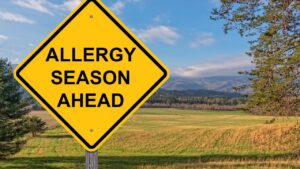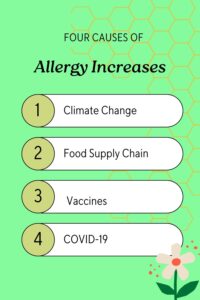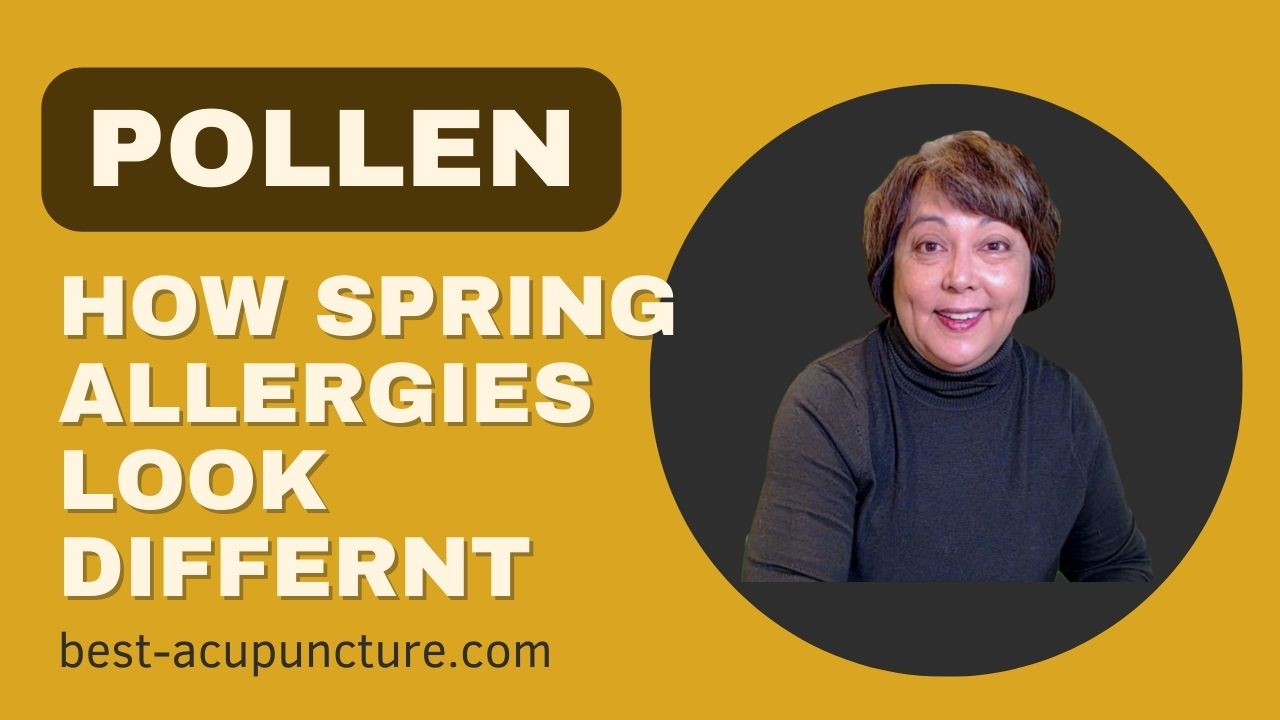In early April, it all began. Clients came in with severe allergy symptoms. Growing up in a world of Western scientific thinking, I like to reference history and use history to predict the future. I have watched allergy season, pollen counts, and client responses for over ten years. Severe allergy symptoms happen when the pollen counts jump to high levels. But, in early April, pollen counts were low.
As the allergy season continued, it got pretty strange. I realized some people had become much more sensitive to pollen. The reactions were sudden and extreme. These reactions could include a loss of voice, eyes swelling shut, or severe sinusitis that felt and looked like a head cold.
How Does Our Body Fight Allergies
 Our body responds to allergens through our adaptive immune system – the IgE antibodies. Antibodies are small and are on cell surfaces. IgE antibodies are on the surface of two of our white blood cells, eosinophils and basophils, both active during an allergic response.
Our body responds to allergens through our adaptive immune system – the IgE antibodies. Antibodies are small and are on cell surfaces. IgE antibodies are on the surface of two of our white blood cells, eosinophils and basophils, both active during an allergic response.
Science doesn’t know exactly how it works, but IgE antibodies are triggered when an allergen comes in contact with the body. Then, IgE antibodies trigger our immune system to create white blood cells, like eosinophils and basophils, to fight allergens.
But what is causing your throat to constrict, eyes to swell shut, and sinuses to blow up into what feels like a head cold? Basophils. Current science thinks basophils release histamine, the chemical responsible for allergic reactions like sneezing, watery eyes, and congestion.
How Can I Know If That Is Happening in Me?
You can monitor your eosinophil and basophil counts through a CBC blood test. When you’re at the height of your reaction, getting a blood draw will show your various white blood cell counts during an infection. Later, when your symptoms have gone away, getting another CBC blood draw will help you understand your healthy white blood cells.
Can your doctor request a CBC blood draw and have it covered by your insurance? Typically, yes, especially for the initial test when you’re feeling unwell. However, it’s not a guaranteed approval because insurance dictates what medical services are reimbursed. When you’re in good health, insurance usually covers the second test only during your annual check-up.
To empower yourself in managing your health, you have the option to request a CBC blood draw from an independent lab directly. In my region, popular choices are Quest or UltaLabs. Currently, the cost for a CBC blood test is $29.00.
Why and How You Can Use This Tool to Improve Your Health?
I’ve fully embraced the use of tools to provide valuable directional insights when diagnosing and treating clients in the clinic. Utilizing blood work enables me to pinpoint diagnoses or confirm suspicions, especially in complex cases. And currently, things are indeed complex.
The difficulty of looking at just one blood test, one point in time, is a point in time isn’t directional. If you are in a forest and want to find your way out of the forest, you need a minimum of two points. The point where you are standing is one point. By itself, it tells you nothing except you are in the forest. A second point outside of the forest creates a line and direction. Two points create direction and allow you to find your way out of the forest.
How Allergy Symptoms Have Increased Over Time
Over the past few decades, there has been a notable rise in allergies. Since 2019, the increase in allergies has been exponential. Here are two examples: children with food allergies and adults with seasonal allergies.
Children Reporting Food Allergies in the United States
- 4.1 million children reported food allergies in 2012.
- 6.0 million children reported food allergies in 2019.
- 16.0 million children reported food allergies in 2021.
Adults Reporting Hayfever/Seasonal Allergies in the United States
What Has Caused The Rapid Increase In Allergy Symptoms and Severity
 There isn’t one reason for the sudden aggressive increase in allergy symptoms over the last few years. Researchers have been examining four potential causes.
There isn’t one reason for the sudden aggressive increase in allergy symptoms over the last few years. Researchers have been examining four potential causes.
Climate Change
There’s been a lot of talk about climate change. The warmer weather is making the pollen season last longer. Take ragweed in the Midwest, for instance. It’s a big cause of seasonal allergies. With the climate warmer, ragweed pollen season has gone from lasting just one week to stretching out over 3.5 weeks.
Food Supply
Our food supply chain in the United States has been experiencing rapid consolidation, focused on a capitalistic profit model. The reduction in competition has enabled these large corporations to focus on profit at the expense of quality.
Many of our fruits and vegetables are picked so green that they never ripen.
Grocery stores are more focused on ultra-processed foods. As they consolidate and vertically integrate, fewer name brands appear on the shelf. Instead, the lower-quality store brands take their place.
Is the increasing food allergies an early warning sign of a weaker gut immune system? The weaker our gut, the worse our allergies.
Vaccines
Research has been done on vaccines and their impact on allergies. Studies have shown that some vaccines in some individuals can trigger an IgE antibody response that leads to allergies. If these were vaccine-induced, could the mRNA vaccines be the trigger? (1, 2, 3)
The mRNA vaccines offer a unique chance to deepen our understanding of their effects on individuals and the environment. While long-term studies, shedding analyses, exploration of process 2 (which manufactured the vaccines but hasn’t been thoroughly tested), and reassessment of third-party lab quality issues are currently lacking, addressing these areas presents an opportunity for continued improvement and a more comprehensive understanding of vaccine dynamics.
COVID-19
Lastly, some researchers are considering the impact of COVID-19. Is it possible that the virus has altered or influenced our immune systems, potentially rendering us more susceptible to pollen? This intriguing question opens avenues for exploring the interconnectedness of health factors and underscores the importance of holistic approaches to understanding and managing allergies.
Helping Yourself With Holistic and Natural Alternatives
Is there something you can do to help your symptoms? Definitely.
I have been using Xiao Chai Hu Tang with my clients who know they have seasonal allergies. They start taking that early in the season. This season was different. What used to be early in the season was the middle of the season. We  figured out their dose. Even starting late, they could take it and come off of their allergy medications after a month.
figured out their dose. Even starting late, they could take it and come off of their allergy medications after a month.
Many of us didn’t know this allergy thing would happen this year. It happened so fast and so severe that most of us didn’t think it was allergies. The loss of the voice was one I suffered from. That encouraged me to create “Chase the Frog Back to the Pond.“ If you are losing your voice from the pollen, you can try that. Just click on the link.
Then there is sinusitis or rhinitis that comes on so fast and so aggressively that you think you have a head cold. I thought it was a head cold, too, until I was treating it.
I tested a variety of treatments for colds, COVID-19, and flu. The clients didn’t respond. So, finally, I gave up on my history and expectation of how allergies act and treated for allergies. That worked.
I don’t have any one formula that worked for the allergies. People needed different formulas based on where their body was weakest. Give the office a call if you want to find another option for treating the allergies this season.
What this Meant for Me
This season has been a learning curve for me. I’ve realized that relying solely on my past experiences and beliefs can sometimes lead me astray. It’s been a wake-up call to listen more closely to the body to uncover the subtle differences that make each situation unique.
 Our immune systems are undergoing changes that are changing how we practice medicine. It means we’ll need to adapt and evolve our practices, becoming more flexible in our thought processes.
Our immune systems are undergoing changes that are changing how we practice medicine. It means we’ll need to adapt and evolve our practices, becoming more flexible in our thought processes.
What had worked in the past may not work now.
To learn more about how your immune system is changing and making better health decisions for you, consider joining HealthHUB by clicking here.

